#and she is basically harmless and fails all her attempts to be an antagonist to the gang
Explore tagged Tumblr posts
Text
rook sprites (scary)


if you dont know already this is my take on tenna in her scary form!!!!!! basically she's the president of idk where but secretly also a mob boss called the rook. she's tall here because she's wearing heels + a hat to hide her anTennas. im gonna explain more in the tags
#deltarune#my art#deltarune oc#tenna deltarune#ok explaination time#teeny weeny tenna acts like a cartoon villain#specifically like lord farquaad. because they are both short#and she is basically harmless and fails all her attempts to be an antagonist to the gang#shes basically a comedic relief#and the rook is actually Evil#and everyone wonders who it is but they dont knkw because they're just a shadow#with shadow henchmen#who does evilmurders in secret (SCARY!!!!!!!)#and the big mystery is who could this scary guy be.#some people think its tenna because the tv torso doesn't turn off but she says shes too short#and also the anTennas are a very important tenna trait but the rook doesn't have them#in reality she has abig hat and coat and heeled boots. tee hee#also she isnt wearing her sunglasses because they are a recognizable trait#under the cool shades she looks like spades king#she cant see without the glasses (they are made of magic idk) because mike stole her eyes IDK!!! IT DOESNT MAKE SENSE#so in rook form shes only moving in a straight line (CHESS REFERENCE) because she cant see#her henchmen guide her ooooo spooky#THATS IT SORRY FOR RAMBLING 😔😔😔😔😔😔😔😔
16 notes
·
View notes
Text
What if in the explosion the brothers got separated?
This is a villain turtle au- if you don’t want to read it you can scroll past! I know it’s a cliche concept but it was fun! And I like doing my own spin on things.
(Note in this au when they’re mutated they are a little older, young kids, as this idea wouldn’t work if they weren’t SEMI competent. They’re still 13, 14, and 15 in modern times, but when they’re first mutated Mikey is 3, Leo and Donnie are 4, and Raph is 5)
Donnie: got scooped up by Draxum in the end, and works as his assistant first, son second. He has a similar position to Foot Recruit; despite being fully capable of actually being useful, he is treated with little respect and does mundane tasks like running errands and fixing random, broken objects. He is trained constantly but is told over and over again that he is “not good enough” yet. Despite this he puts his heart into everything he does. Broken clock? Sure he’ll fix it and it’s got LAZERS now! This causes him to accidentally make problems, and Draxum thinks that Donnie is “a complete and udder fool” which is further from the truth. Villain Donnie is a lot like canon Donnie personality wise but a bit more serious. He does not approve of Draxum’s use of mystic powers, and resents using them himself. He refuses the axe Draxum tries to give him. Draxum has little regard for what Donnie thinks and does, and therefore has an awful relationship with him. And yknow Donnie’s abandonment and self-worth issues? Yeah crank that up to 11. Basically Donnie hates Draxum and the Mystic City, and the Shredder going rouge is the last straw. “WATCH ME! ILL WIPE OUT THE HUMAN THREAT WITHOUT YOUR STUPID MAGIC! YOU HEAR ME BARON DRAXUM- I DEFY YOU!”
Leo: made his way to New York via Senior Hueso. Originally I was going to have him raised by Hueso but then realized it wouldn’t make a lot of sense- so Senior Hueso picks baby Leo up off the streets but ever the wanderer Leo walks right through the GIANT PORTAL IN THE WALL. From there Foot Brute, attempting and failing to find members for the clan, picks up this tiny, promising turtle off the street. “What is that thing?” “I dunno but he’s cute- and we’re in need of members” “That is an actual child” “so?” And then Leo is raised by his two dad- I mean sensei. I put raised lightly. He was treated better than Donnie but he was never given a lot of attention, and therefore turned to causing trouble to get attention. And not just from his dads, from anyone he can. Causing mischief in the city actually helped him in his training, as he became very skilled at sneaking, fighting, and stealing. He butts heads with Foot Recruit a lot because of his constant need for approval and attention. She finds him genuinely annoying while he just views it as “playful teasing.” That comes back to bite him the butt upon meeting Donnie, who comes along to help make form the Shredder armor, but he does not want to be there. Forced to work together, Donnie gets sick of Leo’s crap real fast but they don’t really hate each other, but in the moment they needed to play it off like they did and therefore gave the impression to the other that they DID hate them. Confusing, I know. Draxum tries and fails on multiple occasions to nab Leo but if he does he realizes it’ll put a major dent in his plans. So he forbids Donnie to speak to Leo. But no one stops Leo from talking to him. But Donnie’s coldness and Leo’s cruel banter really doesn’t help them get along. The moment Shredder goes rogue and the Foot Clan collapses, Leo flees in fear. “What if” this and “what if” that but mostly because he tried to take out Shredder and ruined his clan name. But even on the street, Leo remains the same annoying, much more cruel and dark humored mutant.
Mikey: Got scooped up by the Mud Dogs and taken to Big Mama, dragging only Lou’s glasses with him since even as a toddler he picked up anything shiny he saw. I plan to draw the interaction between tiny Mikey and the Dogs (and how Mikey got his name in this au) but that’s a surprise. Anyways pretty quickly he got entered in the Battle Nexus. Think about the appeal that fight would have! Just a couple years of training and then bam! “Introducing Hakka-gu! Our youngest fighter ever- only 8 years old!” And having natural talent and capabilities he was an instant hit. And he wasn’t treated horribly, after all Big Mama couldn’t risk one of her most profitable champions running away. But he is still treated as nothing but that- a profit, a marketable product. No one calls him his real name anymore, no one cares about him, just his capabilities. When he gets injured it isnt “are you okay?” It’s “is your body okay?” And sometimes he’s treated like an idiot- especially by Big Mama. He was never taught language and has very botched speaking patterns because “intelligence isnt important for a champion.” Well eventually he has enough of that, and through a bloodbath, he is able to escape to New York. Now he’ll get respect- he’ll make them respect him. But he gets quickly spotted by the Foot Clan and Draxum, as he’s in the way. Upon finding out about the plans to wipe out humans, he knows he has to stop them. Who can respect him if THESE GUYS wanna take over the world? He’s not getting mistreated again. But when the Shredder goes rogue he panics- he cant stop it but... he knows who can. He goes crawling back to Big Mama and strikes a deal. A better champion. Better than him. And she takes it, although in the end she makes some... alterations to the deal. But this doesn’t stop his quest for respect, and he ultimately heads back to New York.
Raph: Savage! He’s alone, a young child who doesn’t know where to go. He panics, and rampages all the way to New York. After a good, long, temper-tantrum, he finds himself in an alleyway, climbing into a sewer. And there he eats rats, he sets up a not-so-homely-home for himself. He flashes in and out of his anger, but he is almost always emotional and looking for some sort of control in his life. He gets that through rampages, causing destruction in any way he can. Usually he doesn’t make TOO much of a mess but he’s brought down a few buildings in his time. Eventually, upon seeing a rampaging demon-armor in the streets and seeing 2 figures trying to stop it (at this point Mikey is getting Big Mama) he realizes there are others out there like him. And then begins a struggle for control not over the world, but over himself too. There are times he gains control and although lonely, he knows he must learn. He learns English in flickers, and it isn’t perfect, but he can communicate. He can talk to them. Now he just needs to stop hurting them.
Extra notes:
In this au the only one with their weapon is Donnie. Mikey and Leo are skilled with the weapons they have in canon (the Ōdachi and Kusari-fundo) but they do not have mystic powers. Raph is... well... Raph. He can’t fight with weapons well but he can pack a punch.
Mikey is still a chef and artist, taking a liking to the ability to create, but just like with everything else he “needs to focus on his fights” so he can’t have interests. A kid like Mikey HATES this and any time he can he sneaks away to bake and draw. Usually this is at 2 am.
Leo has anxiety. The minute something not in the plan happens, or a loud noise, or having to talk to someone without a script, he goes into fight-or-flight mode. He often finds that the answer is to fight.
Raph is not necessarily evil- he is an antagonist but he is not evil. He simply has no control and lashes out at everything. That’s why he stays in the sewers. Nothing down there’s moves other than rats, bugs, and the water. But he has to get violent urges out some how.
April is a reporter-in-training in the au, as she never met the turtles until after the Shredder incident. She’s immediately interested in it, as she is everything “supernatural” and she gets dangerously close to some of their fights. I don’t know how they meet yet or if she becomes friends with any of them.
After the Shredder incident, the only thing stopping each turtle from destroying New York is each other. Seriously. They keep getting in each other’s ways because “I want to take over the world, not THEM!”
They all have certain villain stereotypes. Donnie is sort of a mad scientist, Leo is a teasing, monologging villain, Mikey acts like a nut case but has a certain intelligence to him, and Raph appears as a total destroyer.
In the end they get redeemed and find out they’re family, but it takes a while. Mikey is the one to hunt down Draxum, while Leo stalks him. Upon finding this out, having 3 out of 4 looking for each other, they find each other pretty fast. And there’s a big dramatic apology scene with all 3 of them, and at first Donnie thinks they’re conspiring against him and ambushes them but is only met with three harmless turtles who refuse to fight him. They tell him what the deal is and Donnie is shocked. And then he’s pissed. “WHY DIDNT DRAXUM TELL ME!? YOURE LYING! LIARS! NO!” In the end he realizes the truth, but it takes a little “talk” with Draxum. And then Donnie nearly commits murder. Don’t worry they stop him. But there’s no Draxum redemption arc because Donnie would continuously try to commit a felony. April is also somewhere in there and like gives the brothers goodness lessons but idk where that fits in I’m still working this out shajajajajaj
#rottmnt#rottmnt au#villain turtle au#i love theeeeese#also sorry theres no cut i couldnt figure it out on mobile#YOURE GETTING ART SOON! IVE ALREADY GOT MIKEY!#TaNTalks#im sorry
54 notes
·
View notes
Text
The Characters of Nisioisin (2)
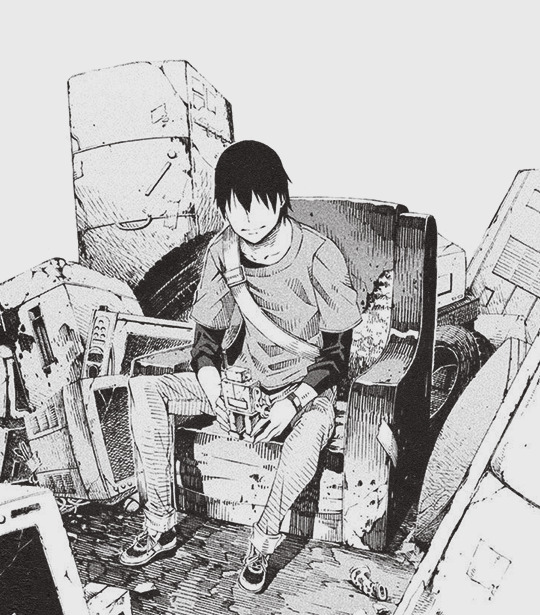
Trickster - Ii (Boku)
This is a post in an ongoing series about the common character archetpyes used by Nisioisin. If you want more information check out the previous post, here. Consider this a part two of that same post. Today we’ll be looking at the nonsense user, and deceiptful protagonist from the aptly titled series “Zaregoto” or in english “Nonsense”. More underneath the cut.
I established the four criteria we are going to be dividing this post into in the previous post, as well as introducing what the idea of the trickster archetype is. Using Kumagawa as the UR-example we’re going to compare Ii-chan with those same tropes.
Introduced as a Villain
Subverts Expectations
Lying, Liar who Lies
Inherent themes of Nihilism
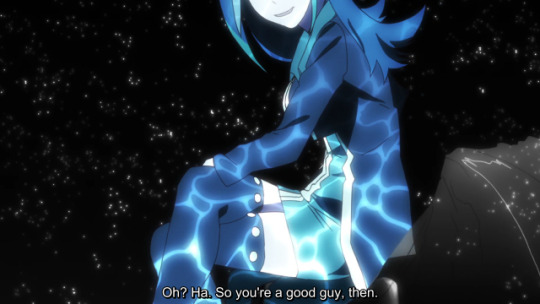
1. Introduced as a Villain
So, next Iichan. He's a special case out of these three because he's actually the series protagonist. But he still kind of fits the criteria because in his series the basic premise of every book is that iichan goes somewhere and a murder happens and then he tries to solve the murder for like the whole book and he sort of kind of solves it and then Jun Aikawa whose much more of a "hero" character than him, the coolest, sickest, strongest detective ever shows up out of nowhere and lectures him.
The sort of conflict set up between Ii-chan and Aikawa as two detectives of the story reminds me of a quote by Maiji Otaro, author of Jorge Joestar (among other things).
“Two detectives, one true. If both are detectives, then both must arrive at the same truth. But does that happen in the novels of this world?” “Most novels with two detectives have one solve it and the other discover the real solution hidden behind it.”
“At that point, are they both still detectives?”
“Hmm.. they’re treated like detectives but certainly, within that novel, the latter is the real detective. But they might switch places in the next novel.”
(Jorge Joestar).
Ii-chan is never introduced as an antagonist from the start of the series he is and always is the narrator. However, he’s still introduced as something he is not. Kumagawa is introduced as a villain and goes on to become a deuteragonist. Iichan is a main character but he doesn’t affect the story like a main character ought to, nor does the story really revolve around him.
So there’s still an inherent lie to his introduction. He is introduced as the center of the story but he is not the story’s real center. However, there’s another subversion implicit in Iichan’s character from the first novel to the second novel.
The first novel is the one where Iichan plays the role of the detective the most straightforwardly. He figures out the trick, solves the case, corners the murderer, but doesn’t solve it all the way and gets lecture by Aikawa at the end. However, there’s a strange way that all the characters react to Iichan despite the fact that he constantly makes himself out to be just a completely harmless, and incapable normal guy.
“Ther’s no meaning. Just like there’s no meaning in your actions. You know, you’re, wow, so you’re the kind of guy who’ll get angry for the sake of a complete stranger. That’s not a very good thing. It’s not bad per se, but it’s not good. [...] That’s because people who can expose their emotions for the sake of someone else are the same people who blame things on others when something goes wrong. I despise people like you.
It had to be the first time in quite a while that someone had spoken that harshly right to my face. Slowly, she brought her glaring gaze to meet my eyes.
“You just let yourself get carried along by other people. You’re the type wo ignores traffic lights just because everyone else is doing it. You’re an abomidable excuse for a human being. They often say ‘Harmonize without agreeing’ but in your case, young man, it’s like you’re agreeing without harmonizing. I won’t say that’s bad. I won’t say anything as to that. One’s identity and worth are not always connnected. A train that runs along a track is better than a train that doesn’t. So I won’t say anything as to that. But I hate people like you. I despise them. People like you always blame things on others, never acknowledging their own responsibility.”
Ii-chan as a character who is introduced as harmless, and passive, never making any choices until we are shown explicitly in the second book that he is not. It’s with his choices in the second book that his true character is revealed.
2. Subverts Expectations
Though for Ii-chan it should really be “avoids any and all expectations.” The Zaregoto is a series that continually asks if the actions of its protagonist are meaningless or not. If any action that Iichan takes effects the outcome of the story in any way.
In Strangulation Romanticist, Ii-chan gets involved with a group of friends who all end up dead or in prison by the end of the story. The central question is what role did Iichan play. Here are some things Ii-chan does in the book, meet with a serial killer and then lie to cover up a police investigation and a private investigator tracking him down giving him time to kill more people, destroys police evidence of another investigation, taunts one girl who murdered another girl into killing herself to atone, knew another murder that was going to take place and did nothing, and then taunts a second girl who wanted to kill herself into killing herself who only survived because the police talked her off a ledge.
“Charges? What charges?” “Falsifying information in regards to the Emoto case, encouraging Aoii’s suicide, not to mention concealment of evidence, plus withholding information and having that little rendezvous with Atemiya. Normally they’d have your ass for that, which I’m sure you’re well aware of, but I’ll take care of it for you. Althought, I suppose even if I didn’t Kunagisa probably would...” (Zaregoto Volume 2)
Therefore, Iichan is someone who acts but doesn’t really face any real consequences for his actions, and that’s because he’s a master of avoidance.
In psychology, avoidance/avoidant coping or escape coping is a maladaptive coping mechanism characterized by the effort to avoid dealing with a stressor. Coping refers to behaviors that attempt to protect oneself from psychological damage.
Iichan is subverting a lot of expectations. He is the protagonist, but the story is not about him. He goes through all of these stories, but he doesn’t ever seem to grow or change from them. He’s a detective, but he never really solves the case or even cares that much about reaching the real truth. He’s written to be a subversion of everything the main character of a detective novel should be.
However, Iichan is also very aware of how a detective should act and deliberately playing with and subverting those tropes. Not only does he subvert the expectations of the reader, but also of the characters around him. He is avoidant, in that way it means he avoids any kind of contfrontation.
I didn’t hate losing. I hated compettition. I was thoroughly put off by the idea of vying for others over something. I hated fighting as well and thus never made friends.
This is a line that gets reused for Kumagawa as well.
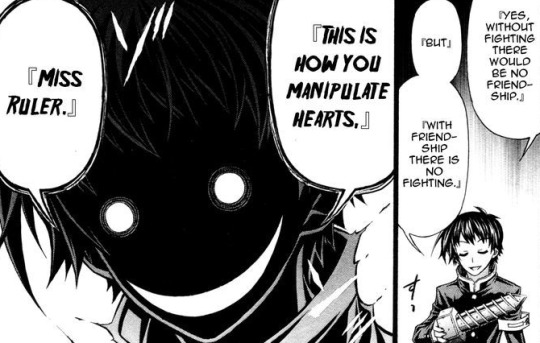
Which helps to illustrate the difference between them. Let’s say there is a problem, Kumagawa will charge head first at the problem and it will explode in his face, and Iichan will do everything in his capacity to never confront the problem or deal with it in any way possible.
Iichan is deliberately aware and sensitive to the expectations of the other people around him, and he feels like he will always be too inferior to fulfill them so he doesn’t even bother to try.
“I have been doing so.” I said. “But you know I have limits, too. It seems like everyone and anyone harbors some sort of expectations from me, and of course I would love to meet their expectations, too, but I cannot meet the expectations if I lack the capability. So to have someone say you failed my expectations is nothing but bothersome.”
Zaregoto Volume 4.
The way he avoids the expectations of others is rendering himself as ambiguous as possible, which is where we get to the next part.
3. Lying, Liar who Lies
Iichan is an unreliable narrator who never tells the truth in a straightforward manner, and even lies for half of the second volume. However, there’s more than that, there’s a deliberate trick to the lies he tells.
Iichan is someone who defines himself as ambiguously as possible. He acts like someone who others cannot possibly understand. Despite narrating from the first person, Iichan is only comfortable when he is not known by anyone. Iichan acts like someone who is barely present in his own story.
Answers have no real point. They’re vague and ambiguos and unsound, and things that are fine that way. In fact, they’re better. Causing real change is a role that should be left up to the true “chosen ones” outstanding individuals like that scarlet Mankind’s Greatest, and the Blue Savant, it was never my responsibility. It was no job for a common loser. For the comic sidekick.
Zaregoto volume 2.
Once again we see the contrast between Kumagawa and Iichan, if Kumagawa is a character who shows how strong and capable one loser can be, then Iichan often waxes poetically in his narrative about how weak and incapable he is. If Kumagawa is a good loser, than Iichan is a sore one.
Iichan defines himself as ambiguous on purpose to avoid responsibility for his actions. In less fancy words, if nobody can understand Iichan than nobody can call him on his shit. That’s his goal, essentially. He doesn’t want to work hard to change, or be confronted about any of his actions, because for him merely the act of living takes all of his effort to tread water without making any progress.
Avoidance is a trauma response, Iichan spends all of his time distancing himself from his own actions rather than confronting any of it. However, Iichan is more complicated than that because Iichan’s ambiguity has another side effect making him out to be something that he is not.
“Just by being there, you startle others, just by being there, you make people lose their grip on themselves.. ther’re a bunch of people like that. You can’t relax when you’re with them, it annoys you, things don’t go as planned, people like that, you know, they’re even scientifically explainable. In other words the missing part. Because the missing part for the observer ends up looking the same, it feels like the person is having their ineptitude pointed out at them, and it startles them [...] You’re just like everyone, and that picks at people’s subonscious, that’s why you’re aimless. And yet you still manage to come out on top. [...]”
Zaregoto Volume 3
All of these things Jun points out in this scene are Jungian ideas of the trickster. Iichan is an inferior person who seems to exist to point out the inferiorities in other people, and use it to play tricks on them. While viewing him as this role of the trickster, Aikawa is not really treating him like a person. (Aikawa’s very dramatic).
Which is where Iichan finally gets his trick. It’s a trick in two parts. He constantly underplays his own agency, while at the same time overplaying his suffering.
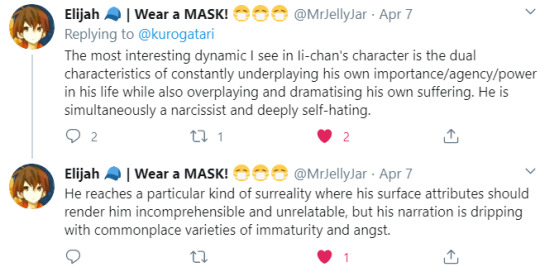
In other words, while insisting that he is the least improtant person on earth, Iichan at the same time hems and haws like the main character of a tragedy. IIichan wants people to empathize with his suffering, and he wants to be important, but he doesn’t want any of the responsibility of being important. He doesn’t want to take any degree of control of himself or others, so he tries to balance himself between these two conflicting ideas.
1) He is not a protagonist, and therefore the events in the story have nothing to do with him. 2) He is the main character of a tragedy. The world is centered around him, he is someone special and important, and that makes him suffer, but he takes no agency in the role.
Doing this he gets the best of both worlds. He gets to always be involved and important to others, while at the same time uninvolved and is never held accountable for his actions. He’s never challenged or forced to grow or change in any way.
These are the two lies that Iichan tells, and those lies form a narrative. Iichan is lying to give a narrative to his own trauma, and therefore try to extract some kind of meaning from it.
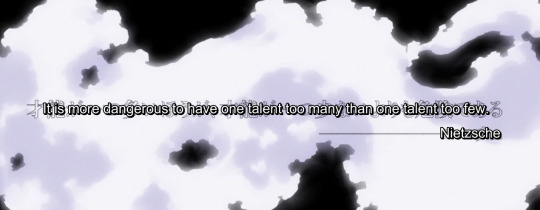
4. Inherent Themes of Nihilism
We once again return to the sacred image.
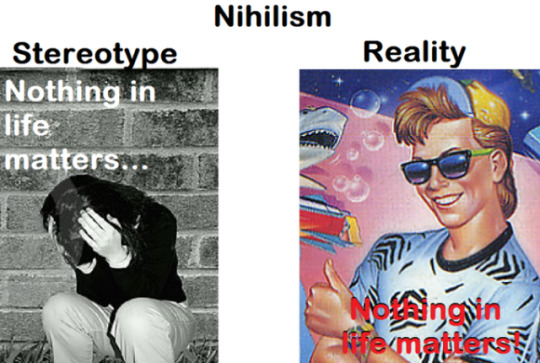
Iichan is a moral nihilist. He’s on the elft side of that image.
Moral nihilism (also known as ethical nihilism) is the meta-ethical view that nothing is morally right or wrong. It is built on three principles.
1. There are no moral features in this world; nothing is right or wrong. 2. Therefore, no moral judgments are true; however, 3. Our sincere moral judgments try, but always fail, to describe the moral features of things.
Iichan’s view is basically that of, if there is no meaning to this world then any attempt to define meaning is pointless. He (let’s say it again class) usually uses this as an attempt to evade any and all responsibility for his actions.
Iichan doesn't want other people to look at him, he doesn't want to be at fault when things go wrong, but he also wants to be important. So he's continually on a tight rope walk with those two very conflicting desires.
So basically Iichan sees no value in his own actions. He sees no value in the world. He doesn't really have any set of morals, except that he thinks murder is bad. Except sometimes he doesn't really care if certain people are murderers. Zerozaki is a murderer and Iichan hates him but doesn’t actually make any sincere attempts to stop him. Kunagisa commits murder in volume 4/5 and Iichan goes out of his way to cover it up. He apparently doesn’t consider goading a girl into suicide to be a form of murder. But at the same time he's so desperately searching for meaning, because he wants to feel fulfilled.
Iichan thinks that talent and genius are perhaps one thing that could give the world meaning. His best friend is a super genius, and he kind of clings to her and is jealous of her because she's someone special. See he thinks there are people whose lives have meaning despite being a pretty blanket nihilist, but because he's not talented he's not one of those people. Talent is something that could possibly give life meaning but being outside of the talented people it makes no difference to him he can only gaze at it from afar
Iichan is someone who is constantly downplaying his own meaning, while at the same time trying to find some meaning vicariously through others, like Aikawa and Kunagisa who he considers to be the real heroes of the world. Despite Iichan insisting there’s no meaning, he also has an attraction to narrative view of the world. Which is something that you know... has meaning, because stories are written with intent and purpose by an author.
In the sixth volume there’s a concept called “The Story” which one character belives that everything is pre-destined, like it’s all some pre-written story. Therefore while you can make small changes in your own actions it never effects the big picture in any way.
This is once again a very convenient idea for Iichan, who avoids responsibility to believe in. He’s very attracted by this idea because it takes control out of his hands and means his own actions aren’t really his fault.
To be honest, this must be one of the most boring conversations to be listening in on. It had gone so far into the conceptual, that even for myself, participating in the conversation, the words of the man with the fox mask seemed as hazy and illusory as a dream. You could say I do not understand what he is saying. However, then why. Then why does what this person says strike so deep? Why does it resonate? [...] Then, no. I do not want any part of such importance. I do not want anything to do with the core of the story.
Here we go with Iichan’s double negative, he denies having any role or agency in the story and yet at the same time believes that such a thing as the story exists because it means to some extent his actions are out of his control because he can’t accept that they are.
Is Iichan’s role in the story ultimately meaningless? No. There are always clear and distinct consequences for his actions. In the same volume (6 - cannibal magical) where the concept of the story are first introduced that everything is predetermined and you can’t change the big picture, the events of the story disprove that assertion.
Iichan is given like, a million warnings not to go to a lab. Aikawa tells him not to go to a lab because she has a bad feeling about it. The literal assassin sent to that lab talks to Iichan and says “Yeah, I was sent here to kill people.” Another person who was in the same situation just walks away from the problem. Iichan sees the assassin going out to kill people in the middle of the night and just chooses to... go to sleep.
Then he wakes up to everyone dead in the morning. The point being Iichan had a million chances to avoid this situation, takes absolutely none of them, and then acts like this was a completely unavoidable fate. He hems and haws about having no choices, but he’s clearly given choices, he just doesn’t take them, or makes exclusively bad ones.
Iichan wants to avoid consequences by not choosing, however the choice to not choose is still a choice in itself. Everything is a choice. Even avoidance is a choice. Which is why Iichan’s actions do actually have meaning, just not in the way he wants them to. He’s not a special person, and he’s not anyone extraordinary, but he is someone who has to face the consequences of his actions no matter how many narrative tricks he pulls to avoid them.
The actual trick of Iichan’s story is that he really is the protagonist, he just doesn’t want to be.
71 notes
·
View notes